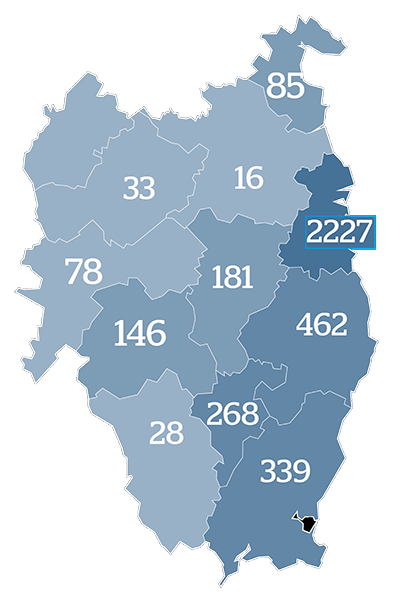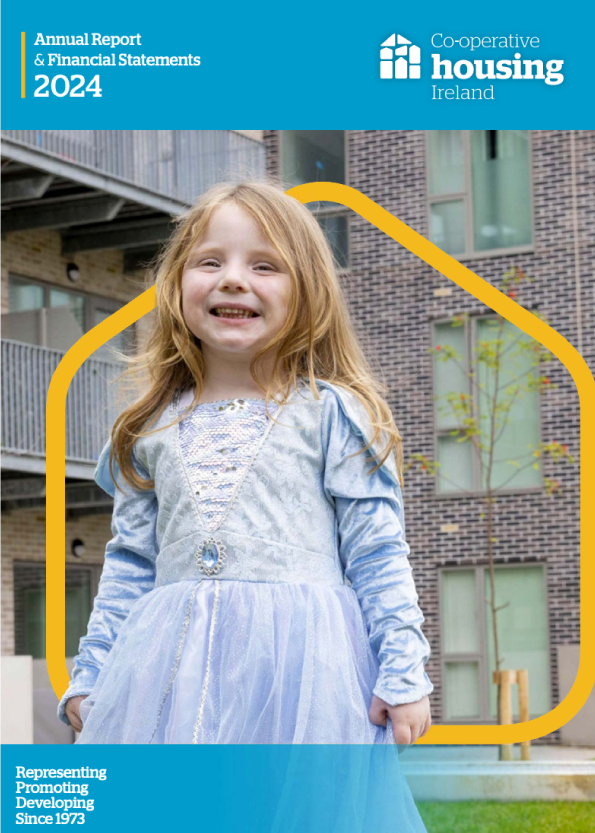What We Do
Co-operative Housing Ireland works closely with various stakeholders in the housing sector, including Local Authorities, Government, and developers, to provide high quality social-rented homes across the country.
In addition to the 4,000+ homes provided, CHI has supported owner-occupier housing co-operatives to deliver 3,000 affordable homes.
What We Do
Co-operative Housing Ireland works closely with various stakeholders in the housing sector, including Local Authorities, Government, and developers, to provide high quality social-rented homes across the country.
In addition to the over 6,708 homes provided, Co-operative Housing Ireland has supported owner-occupier housing co-operatives to deliver 3,000 affordable homes.
.jpeg)
Our Vision
Our Vision is of a society where everyone has access to housing delivered co-operatively.
Our Mission
Providing homes co-operatively to meet the needs of our communities by working in partnership:
- to enable vibrant and sustainable communities
- to be a voice for delivering housing co-operatively and for those in housing need
- to support co-operative and other community-led housing initiatives
.jpeg)

Our Values
Set of core beliefs held by the organisation which guide our behaviours as an organisation and what we expect of our staff, suppliers, partners and collaborators with whom we work.
- Co-operative
- Respect and professional
- Inclusion
- Sustainability
- Passion
History of CHI
Co-operative Housing Ireland (CHI), formerly NABCo, was formed in 1973 to support the growing housing co-operative movement that emerged in the late 1960s and 1970s.
View our organisational timeline.jpeg)
We collaborate to achieve our goals and foster leadership, recognising that working together allows us to achieve more.
We treat people with professionalism and dignity
We acknowledge and value differences in everyone and how these differences contribute positively to our culture and outcomes.
We seek innovative solutions to help promote environmental, social and financial sustainability and resilience for our organisation.
We are enthusiastic about our work and strive to do our best and achieve success. We are committed to excel in service delivery.
Our Awards

Winner
Excellence in Communications
2024

Winner
Building Community
2023

Winner
Residential: Social and Affordable Housing Up to 5m
2023

Winner
'Net Zero in Housing'
2023

Winner

Winner
Social Housing Award 2021

Finalist

Shortlisted


Our Board

Gerry is the chairperson of the CHI Board. He is a Chartered Accountant and experienced Finance professional having spent his early career working with PwC and subsequently spent 28 years with Musgrave Group in senior finance leadership positions before retiring in 2021. He has extensive experience in financial risk management, Corporate Governance and regulatory compliance. Gerry is a director of Douglas Credit Union, a not-for-profit regulated financial institution and lives in Cork with his family.
Read Bio

Pearse O’Shiel is a Ph.D. researcher and lecturer in the philosophy of education. He was raised in a home built by the New Homes Housing Co-operative in Dublin. Pearse lives in Co. Clare and is married with three adult children.
Read Bio

Frances Kawala, although now retired, uses her arts background to find creative ways to encourage community involvement working with several local organisations to promote the needs of seniors, including their housing needs. She lives in a CHI home in Birr, Co. Offaly.
Read Bio
.jpg)
Eugene has over 40 years experience in the financial services industry and has held senior positions in Ulster Bank Group and The National Asset Management Agency. He is a Fellow of The Institute of Bankers in Ireland and holds The Diploma in Company Direction from The Institute of Directors in Ireland. Eugene lives in Dublin and is married with three adult children
Read Bio

Nuala grew up in Bray, Co. Wicklow, and is the mother of one son. She works as a nurse, and previously owned and ran a creche in Leopardstown. Her son has special needs and she actively engages in courses to support his care. Nuala describes herself as a ‘people person’, with a lot to offer and to learn. She loves putting her knowledge to good use in the community and getting things done.
Read Bio

Brian is chair of the Development and Growth Committee. He has a professional background in financial services, with over 25 years of experience in capital markets, treasury management, banking and investments. Brian holds a business degree from the University of Limerick, an MSc in Investment and Treasury from Dublin City University and is a Certified Bank Director, Certified Investment Fund Director and a Fellow of the Institute of Bankers in Ireland. He is married and lives in Meath with his wife and three children.
Read Bio

Enda Egan is a serving civil servant since 1983. He has been volunteering for many years with the Richard Pampuri Social Club which is a social club for young adults with learning disabilities and special needs.
Read Bio

Caitriona is from Dundrum, Dublin and has one son and one granddaughter. She is inquisitive and loves learning, studying many things from art to Compliance. She worked for 17 years in the property industry and is now working in the public sector.
Read Bio

Derek Maher is the Chairman of Downview Residents’ Association and is currently Chairman of the Co-operative Housing Ireland Munster Co-operative. He is married with four children and two grandchildren.
Read Bio

Peter lives in Dublin and has served on the Development & Growth Committee since 2023. Peter has extensive experience in governance, financial risk management, accounting and regulatory compliance. He has held a number of leadership positions with BDO Ireland, a leading accounting and professional services firm, and retired as a partner in 2025. Peter is a chartered certified accountant ( FCCA ) and a chartered director ( IOD Ireland).
Read Bio

Born in London in 1965, Kevin is a proud dad to three kids and seasoned professional with decades in the entertainment industry. Working as a radio DJ and promoter, he brings people together through music and events while remaining passionate about community work and giving back.
Read Bio
Our Management Team







Read our Gender Pay Gap Report
Our Governance Policies
Co-operative Housing Ireland is committed to being open, transparent and accountable in how we operate. As a registered charity and an Approved Housing Body, we follow a number of national standards that guide how we are governed, how we report, and how we manage public funds. Below is an overview of the codes and standards we work to. Charities Governance Code: We follow the Charities Governance Code set out by the Charities Regulator. This code helps ensure that Co-operative Housing Ireland is well governed, responsible and acting in the best interests of our Member Tenants and the public. We report our compliance to the Charities Regulator each year. Charities SORP (FRS 102): Our Annual Report and financial statements are prepared in line with the Charities Statement of Recommended Practice (SORP) and Financial Reporting Standard 102. These standards ensure our financial reporting is clear, transparent and consistent. Housing SORP: As an Approved Housing Body, we also follow the Housing SORP, which sets out additional reporting requirements for organisations that provide homes and housing services. Approved Housing Body Regulatory Framework: Co-operative Housing Ireland operates under the AHB Regulatory Framework managed by the Housing Agency. This framework covers key areas including governance, financial management, performance and risk. It ensures we meet the standards expected of organisations delivering social and affordable housing. Co-operative Rules: We are governed by our own co-operative rules, which guide how decisions are made, how our Board operates, and how Member Tenants have a voice in shaping our organisation.
This Strategy was originally developed by our Board, which consists of democratically elected representatives from our affiliated local co-operatives.
Information and guidance for the members of the Board, executive and staff of Co-operative Housing Ireland about the organisation and the conduct of its business affairs.
The Register of Directors’ Interests Policy is intended to assist Board Members in declaring any interests which might conflict with their work with the Association.
Co-operative Principles
Co-operatives are voluntary organisations, open to all persons able to use their services and willing to accept the responsibilities of membership, without gender, social, racial, political or religious discrimination.

Co-operatives are democratic organisations controlled by their members, who actively participate in setting their policies and making decisions. Men and women serving as elected representatives are accountable to the membership. In primary co-operatives, members have equal voting rights (one member, one vote) and co-operatives at other levels are also organised in a democratic manner.

Members allocate surpluses for any or all of the following purposes:
developing their co-operative, possibly by setting up reserves, part of which at least would be indivisible;
benefiting members in proportion to their transactions with the co-operative;
and supporting other activities approved by the membership.'

Co-operatives are autonomous, self-help organisations controlled by their members. If they enter into agreements with other organisations, including governments, or raise capital from external sources, they do so on terms that ensure democratic control by their members and maintain their co-operative autonomy.

Co-operatives provide education and training for their members, elected representatives, managers, and employees so they can contribute effectively to the development of their co-operatives. They inform the general public – particularly young people and opinion leaders – about the nature and benefits of co-operation.

Co-operatives serve their members most effectively and strengthen the co-operative movement by working together through local, national, regional and international structures.

Co-operatives work for the sustainable development of their communities through policies approved by their members.










.svg)

















